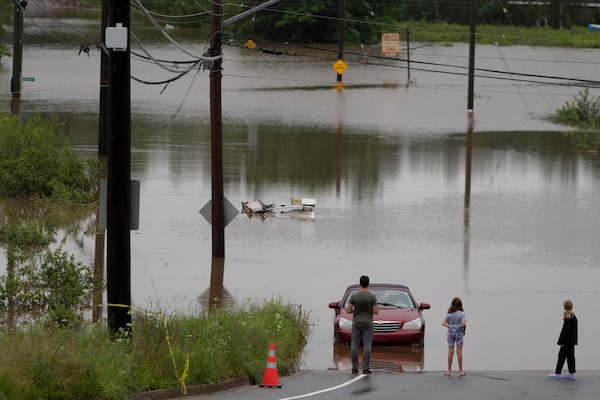
People stand at the edge of flood water after a major rain event in Halifax, on July 22, 2023.Darren Calabrese/The Canadian Press
The federal government has launched a new grant program to help cities pay for climate adaptation measures such as restoring wetlands and strengthening dikes, roads and bridges.
The $530-million program falls under the the federal government’s National Adaptation Strategy, launched in June, 2023, and is designed to help cities bolster infrastructure in the face of storms, floods and wildfires expected to become more frequent and severe as a result of climate change.
But while the Federation of Canadian Municipalities welcomed the new funding, saying it would help cities tackle the multibillion-dollar costs of adapting to climate change, the mayors of three B.C. communities devastated by flooding in 2021 held a press conference to decry the federal government’s lack of financial support for their cities, saying their applications for disaster relief funding had been turned down, leaving residents and infrastructure in limbo.
The funding programs are administered by different departments: the new grant program by Environment and Climate Change Canada and the Disaster Mitigation and Adaptation Fund (DMAF) by Infrastructure Canada. But both initiatives reflect the fact that municipalities are on the front line of climate-related impacts and seeking millions to adapt and recover.
“I have a community that is desperately in need of dikes. I have people that are in desperately in need of protection. We don’t have any for them,” Merritt mayor Michael Goetz said Monday at a press conference in the Fraser Valley community of Abbotsford.
Merritt was hit by severe flooding in 2021 that forced the entire community of about 7,000 people to be evacuated. It is seeking federal funds to rebuild dikes and do other restoration work.
Mr. Goetz, along with Abbotsford mayor Ross Siemens and Princeton mayor Spencer Coyne, said Monday that their communities’ applications to the Disaster Mitigation and Adaptation Fund (DMAF) had been turned down, despite staff and consultants putting significant effort into the applications.
Micaal Ahmed, spokesman for Sean Fraser, the Minister of Housing, Infrastructure and Communities, confirmed the three communities’ applications were unsuccessful. He said all projects submitted for funding under DMAF are assessed on the information provided in the application, particularly when determining hazard risk, resilience and return on investment. Infrastructure Canada communicates reasons for decisions directly to applicants, Mr. Ahmed said, adding that the government will continue to work with partners across the country to finalize funding agreements.
At the press conference, Merritt mayor Mr. Goetz said his community’s application was turned down for a lack of information, despite what he said was a detailed application involving 500 pages of material.
“I have to wonder if this would happen if we were on the East Coast – I’m not really sure it would have,” he said.
The Federation of Canadian Municipalities (FCM) will run the new grant program – the Local Leadership for Climate Adaptation initiative – through the Green Municipal Fund, a federally financed program founded in 2000. Funds are to be rolled out over eight years and the maximum grant available is $1-million.
“This is really meant to help accelerate action – many municipalities already have a sense of which projects they want to achieve, it’s a question of having the tailored funding to achieve it,” said Chris Boivin, managing director of the Green Municipal Fund and chief development officer with the FCM.
Ottawa first announced the $530-million for community projects in November, 2022, as part of a broader, $2-billion climate-change package but the funds were not formally approved until this year’s federal budget.
The new grant program represents only the “tip of the iceberg” of investment required, said Joanna Eyquem, managing director of climate-resilient infrastructure with the Intact Centre on Climate Adaptation at the University of Waterloo.
A 2020 report by FCM and the Insurance Bureau of Canada estimated the cost to municipal governments of avoiding the worst impacts of climate change at $5.3-billion a year.
Ms. Eyquem welcomed the program’s inclusion of nature-based solutions, such as wetland management, as well as so-called grey solutions such as expanded storm-water systems.
“It is critical that funding is spent on actions that reduce risk on the ground, using land-use planning and natural infrastructure, like restored wetlands and enhanced tree canopy, not only grey solutions,” Ms. Eyquem said.
Ottawa city councillor Tim Tierney said the new money will help fund projects that increase resiliency, such as improved retaining walls along the city’s extensive waterfront.
“We’ll take anything we can and we’re just happy to finally actually have some kind of structure in place” for the funding to flow, said Mr. Tierney, who is also third vice-president of FCM.